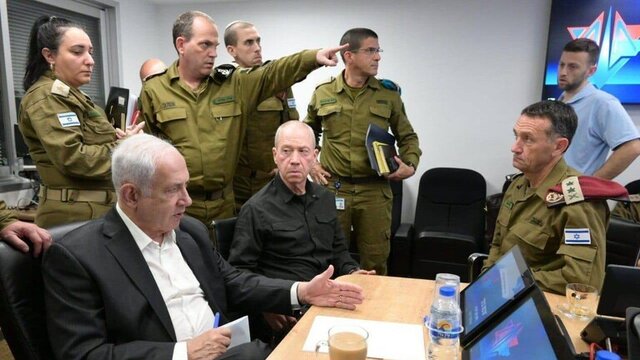The missile and drone response of the Islamic Republic of Iran against the Zionist regime was a legitimate, deterrent, punitive, and necessary measure that was carried out due to the terrorist operations of this regime against Iranian advisers in Syria in the last few months. Its repetition is subject to the Zionists’ new adventure against the positions and the interests of our country. The Islamic Republic of Iran never seeks to spread tension in the region and has no need to secure and protect its interests and national security through tension.
The fact that the Zionist and American authorities introduce this legal action as a tension-causing is mainly a “projection” aimed at realizing Netanyahu’s “personal goals” regarding the Gaza war, which has assumed “personal dimensions” in his favor.
Field estimates and reports from the internal circles of the Zionist regime show that the regime’s “killing machine” in the Gaza war has practically ground to a halt. Defeat in this war, which was predictable from the first weeks, has resulted in enormous costs for the Zionist regime, so in addition to internal crises in various fields, domestic public opinion has also turned against Netanyahu and his war cabinet.
The challenges created by the killing of the people of Gaza by the war cabinet and Netanyahu personally, and that seen in the speeches of the heads of the Zionist regime, have a Prestigious and strategic aspect.
For this reason, the loudest voice that can be heard today inside the Occupied Territories and by the Zionist residents is “the removal of Netanyahu from power.”
In this regard, the Zionists living in Occupied Palestine continue to gather in various places, including in front of the headquarters, in protest against the current situation. Netanyahu and the cabinet building continue to fight and demand Netanyahu’s removal from power and hold early elections.
In the meantime, Iran’s punitive action not only did not lead the Israeli society to converge with Netanyahu, but on the contrary, it intensified the protests against Netanyahu. For example, the movement known as “Freedom of Our Land,” which is one of the organizers of the recent demonstrations in Tel Aviv, recently issued a statement emphasizing the importance of the protest gathering and noted that “Netanyahu and Ben-Guir are endangering Israel’s security in an organized manner and lead us to the abyss of destruction.
In any case, today, Gaza is the scene of field, military, and intelligence failures of the Zionist regime. At the same time, it is a straightforward document of widespread genocide, violation of all known human principles, crossing all the red lines of international law, and non-adherence to any moral, political, etc. principles, which has caused the world community to focus on it.
The focus of public opinion on the Gaza war has had three significant consequences. First, it has put the developments in Palestine and Gaza in the focus of the world’s attention. Second, it has intensified internal and external pressure against Netanyahu’s war cabinet to end the war and remove him from power. Third, it has caused the regional and Western partners of the Zionist regime to be more cautious in supporting its belligerent policies.
Netanyahu has made the Gaza war a personal issue. According to Netanyahu, only one thing can save him politically from the Gaza swamp, and that is “marginalizing” Gaza from the context of regional and international events and developments. Following the missile response of the Islamic Republic of Iran, Netanyahu and his affiliated extremist elements in the occupied territories are seeking to “highlight” other issues, including tension with Iran, as the first issue of the region and the world.
This is even though a significant part of today’s problems in the region and the challenges and tensions created in the military and security dimensions are caused by the Zionist regime’s war against Gaza. The killing of more than 33,000 Palestinians and the destruction of service, medical, religious, educational, etc. infrastructures in Gaza is so “painful” that nothing can marginalize it.
With diplomatic mechanisms and…, Netanyahu’s cabinet is seeking political and media “space” against Iran’s missile response and “inverted image” of this action and its “oppression” to divert public opinion from what is happening in Gaza and by intensifying “threats” from Iran should put the Zionists and the internal opposition behind it, But this “trick” does not lead anywhere despite the “big issue” called Gaza.










0 Comments